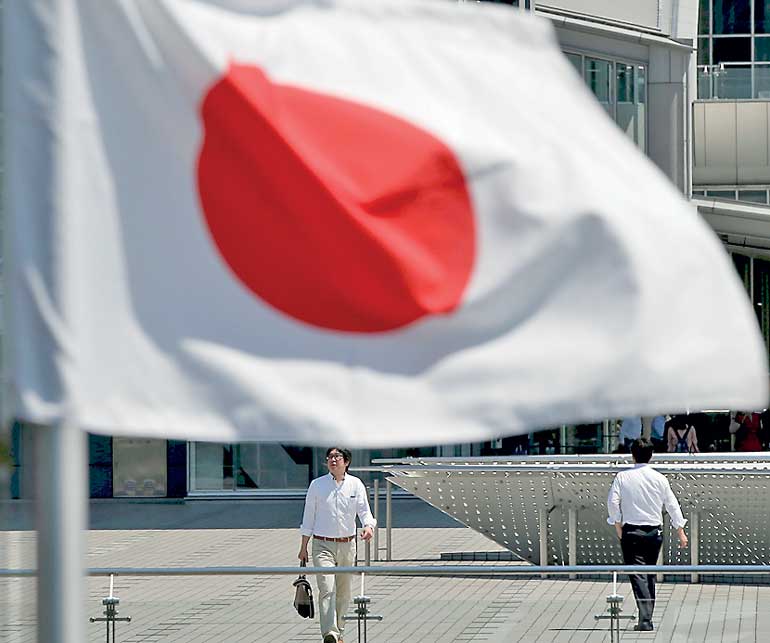Sunday Feb 22, 2026
Sunday Feb 22, 2026
Friday, 22 May 2015 00:00 - - {{hitsCtrl.values.hits}}

Businessmen walk behind a Japanese national flag at a convention centre in Tokyo May 21, 2015. Japanese manufacturing activity rebounded modestly in May as output and new orders picked up, suggesting a much-needed improvement in demand at home and abroad. REUTERS
Japan unveiled a plan on Thursday to provide $110 billion in aid for Asian infrastructure projects, as China prepares to launch a new institutional lender that is seen as encroaching on the regional financial clout of Tokyo and its ally Washington.
The amount of Japanese funds, to be invested over 5 years, tops the expected $ 100 billion capitalisation of the Asian Infrastructure Investment Bank (AIIB), the Beijing-sponsored lender scheduled to begin operations next year.
Japanese officials said the plan, announced by Prime Minister Shinzo Abe at a symposium of Asian officials and experts, represents a 30 percent increase over Tokyo’s past infrastructure funding.
Japan said it wants to focus on “high quality” aid, for example, by helping recipients tap its expertise in reducing pollution while building roads and railways. That’s an implicit contrast with the AIIB, whose projects Washington has said may not adequately safeguard the environment.
“We intend to actively make use of such funds in order to spread high-quality and innovative infrastructure throughout Asia, taking a long-term view,” Abe said in a speech announcing the plan.
About half the funds will be extended by state affiliated agencies in charge of aid and loans and the rest in collaboration with the Asian Development Bank (ADB).
Japan hopes the aid will help draw private funds to help meet the vast demand for infrastructure in Asia.
The United States and Japan were caught off guard when a total of 57 countries, including Group of Seven members Britain, Germany and France jumped on board the AIIB bandwagon by March.
The two allies have stayed out of the China-led institution, seen as a rival to the U.S.-dominated World Bank and Japan-led Asian Development Bank, citing concerns about transparency and governance - although Tokyo for one is keeping its options open.
Finance officials said Japan’s aid plan had long been in the works as part of a Group of 20 pledge to meet global needs.
But worried that Japan may look less pro-active than Beijing, Tokyo also wants to showcase its support for the region.
“We had thought it was better not to speak up much, but that doesn’t get through,” Koichi Hagiuda, a special aide to Abe in his Liberal Democratic Party, told Reuters.
“So some demonstration seems to be needed.”
Japanese and Chinese finance officials will meet in Beijing on June 6 and may discuss the AIIB, but Tokyo looks unlikely to make a decision on joining any time soon.
LDP lawmakers looking into the matter will put together a report later this month or in early June, but will only state the pros and cons of joining or staying out, said Masahiko Shimayama, a member of the party panel.
“I think it’s unlikely that the government would make a decision on when to join based on our report,” he told Reuters.
Tokyo, which given the size of its economy could become the No. 2 donor if it decides to join the AIIB, may well keep its powder dry for some time to come.
“If it (AIIB) becomes a proper financial institution for the sake of Asia, there is no reason to be embarrassed about joining later,” Hagiuda said.
The United States and Japan agreed last month that the World Bank and ADB should team up with the AIIB in syndicated loans as a way to help the new lender establish strong standards.
The AIIB is holding a meeting of founder members in Singapore this week to decide on the articles of association and operational details. A delegate to the conference, speaking on condition of anonymity, said it was unlikely the new bank could start lending at the start of 2016 as predicted, given the need for member countries to get approvals from their legislatures.
“China hopes that members get such approvals by year-end and the operations start from the next year, said the Asian delegate. “But I wonder if it is possible, given domestic political situations in each country.”